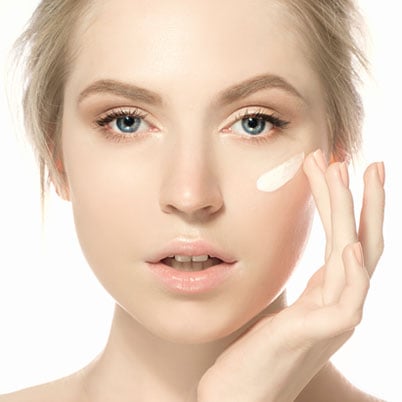Dealing with parched, flaky skin? No need to head to the beauty supply store; your cure can be found right in the fridge.
"Kitchen-grade coconut oil is a great moisturizer for very dry, inflamed and sensitive skin," says Stainhouse. The product contains fatty acids and anti-bacterial properties, both of which help tame inflammation and calm itchiness and redness. What's more is that since coconut oil is solid at room temperature, it can be applied like a regular face cream.
"Kitchen-grade coconut oil is a great moisturizer for very dry, inflamed and sensitive skin," says Stainhouse. The product contains fatty acids and anti-bacterial properties, both of which help tame inflammation and calm itchiness and redness. What's more is that since coconut oil is solid at room temperature, it can be applied like a regular face cream.
There's a reason we so often hear about the boundless curative properties of argan oil: Its anti-aging benefits are dermatologist-approved.
Pure argan oil boasts high concentrations of anti-inflammatory ingredients, like omega-3 fatty acids and vitamin E. It's lightweight, fast-absorbing and deeply moisturizing, and it actively helps to repair cell membranes. Plus, it prevents oxidative damage to the DNA and collagen in the skin, says Stainhouse (aka the process that leads to environmental skin aging). With consistent use, you'll notice a decrease in the appearance of fine lines.
Work the product into your nightly skin-care routine by using a cleansing oil that contains argan oil, such as Burt's Bees Facial Cleansing Oil, $16. The product contains coconut oil for extra moisture.
Pure argan oil boasts high concentrations of anti-inflammatory ingredients, like omega-3 fatty acids and vitamin E. It's lightweight, fast-absorbing and deeply moisturizing, and it actively helps to repair cell membranes. Plus, it prevents oxidative damage to the DNA and collagen in the skin, says Stainhouse (aka the process that leads to environmental skin aging). With consistent use, you'll notice a decrease in the appearance of fine lines.
Work the product into your nightly skin-care routine by using a cleansing oil that contains argan oil, such as Burt's Bees Facial Cleansing Oil, $16. The product contains coconut oil for extra moisture.
If you have oily skin, don't write off facial oils completely. Grapeseed oil actually works to prevent oil production in the skin. This is because it has similar properties to the oils our skin produces naturally, says Stainhouse. Grapeseed oil helps create a negative feedback system, telling our oil glands that there is enough oil in the skin already and that they can stop making more.
"Grapeseed oil also has astringent properties that can make the skin feel tighter, as well as omega-6 fatty acids that can reduce inflammation and potential acne lesions," says Stainhouse. This ultimately leaves the skin feeling moisturized, but not greasy.
"Grapeseed oil also has astringent properties that can make the skin feel tighter, as well as omega-6 fatty acids that can reduce inflammation and potential acne lesions," says Stainhouse. This ultimately leaves the skin feeling moisturized, but not greasy.
Jojoba oil is great for combination skin in particular as it helps retain moisture while controlling oil production. Like grapeseed oil, it is similar in composition to the skin's natural oils, and thus prevents our glands from producing too much grease.
Jojoba oil contains anti-inflammatory properties like vitamin E, vitamin B and fatty acids, as well as copper, which helps with skin repair. Plus, the product is incredibly lightweight and easily absorbs without leaving a greasy residue.
Jojoba oil contains anti-inflammatory properties like vitamin E, vitamin B and fatty acids, as well as copper, which helps with skin repair. Plus, the product is incredibly lightweight and easily absorbs without leaving a greasy residue.
Tea tree oil is known best for its anti-bacterial benefits. "Some studies suggest that it is as effective at treating inflammatory acne lesions as 5 percent benzoyl peroxide," says Stainhouse. So if products like benzoyl peroxide and salicylic acid make your skin cranky, this might be a worthwhile option.
How does it work exactly? "Tea tree oil kills bacteria in the pores and deeper hair follicles where acne lesions can begin," Stainhouse explains.
Just keep in mind that since tea tree oil comes from a natural plant, you might be slightly allergic or sensitive to it. To be safe, Stainhouse recommends trying a test spot on your inner arm before applying it to your face.
How does it work exactly? "Tea tree oil kills bacteria in the pores and deeper hair follicles where acne lesions can begin," Stainhouse explains.
Just keep in mind that since tea tree oil comes from a natural plant, you might be slightly allergic or sensitive to it. To be safe, Stainhouse recommends trying a test spot on your inner arm before applying it to your face.






